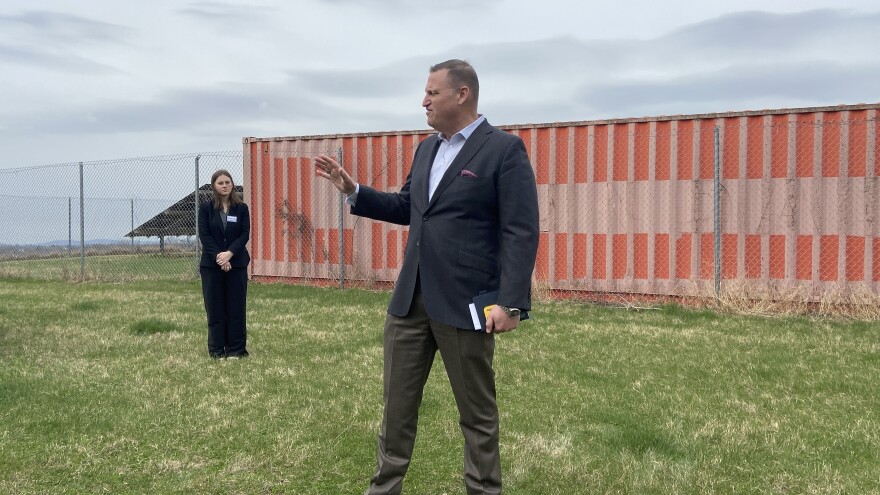FORKS TOWNSHIP, Pa. — At Crayola’s township facility, 1 billion crayons and 750 million markers are manufactured with the power to the sun.
“Imagine what your customer reaction is to that — customer reaction was very positive,” Crayola President Pete Ruggiero said.
“There is no competitor of ours with a solar farm on the hill. They're all manufacturing in Asia with fossil fuel-generated electricity.
“There's that moment of truth in the aisle when the consumer shows up at back to school and sees on our packaging, ‘made with renewable energy.’”
On Thursday morning, Ruggiero, along with PennEnvironment Research & Policy Center officials and local legislators, held an informational session on the company’s 3.53 megawatt solar farm.
“Just like Crayola sparks imagination with every crayon, their solar commitment sparks hope for our future."PennEnvironment organizer Madeleine Hepting
The farm, near the facility in the 1100 block of Church Road, holds 33,000 solar panels.
It’s the latest event as part of PennEnvironment’s solar tour series, an effort to highlight examples of renewable energy and sustainable choices businesses, as well as other organizations, can make.
“We're really proud to highlight Crayola’s leadership today, and we hope that other businesses across the Lehigh Valley, across Pennsylvania and across the country will follow their example,” PennEnvironment organizer Madeleine Hepting said.
“Just like Crayola sparks imagination with every crayon, their solar commitment sparks hope for our future.
“And we hope that Pennsylvania residents and businesses are inspired to make clean energy and energy efficient upgrades in their own lives, too.”
Geothermal, efficient lighting, recycling
Crayola has more than a century of history in the Lehigh Valley.
When the company started, it was called Binney & Smith and the main two products sold were slate pencils and chalk.
"... We have sustainability embedded in our culture.”Crayola President Pete Ruggiero
“We were in the manufacture of slate pencils,” Ruggiero said. “In Pen Argyl and Wind Gap up the road is where all of our slate came from to make those slate pencils.
"We also make chalk. Right down the road in Nazareth were all the limestone pits that came in to make our chalk.
“And we located our plant along the very high current flow of the Bushkill Creek to power our manufacturing process with hydro energy.
"So we have sustainability embedded in our culture.”
Over the years, the company changed and grew, but the emphasis on staying local remained. Today, 70% of what Crayola makes globally is manufactured in the Valley.
“And that was an intentional decision that we made in 2007,” Ruggiero said. “When many other companies were picking up and moving overseas, we doubled down and invested here.
“We invested because of the great people that we have in the Lehigh Valley, and we invested because we felt that close to market responsiveness for our customers was a critical competitive advantage.”
The majority of the crayons manufactured are cooled with geothermal water, and the company’s corporate office is cooled and heated through geothermal.
The company uses energy-efficient lighting and recycles plastics.
“We have moved away from a very high-cost, high-electric load hydraulics to electric or hybrid electrics to enable our processes,” he said.
“We recycle all of our plastics and all of our crayons in our processes. This stuff's very expensive, but it also makes no sense to send it to the landfill when we can reuse it in our processes.”
Future ‘bright as the sun’
Down a gravel road marked ‘Purple Mountains' Majesty Way’ Crayola’s solar field sits, fenced off.
Company leaders in 2009 worked with PPL, UGI and state officials to build the solar field. It got a $1.5 million grant from the American Recovery and Reinvestment Act.
“The future of both Crayola and solar power is as bright as the sun."Then-state Department of Environmental Protection Secretary John Hangerin a 2009 news release
"The Stimulus Act funding powers, along with the sun and Crayola crayons, creates jobs right now to build this large solar facility, protects the jobs already at Crayola, and produces pollution-free electricity for years to come,” then-state secretary of Environmental Protection John Hanger said in a 2009 news release.
“The future of both Crayola and solar power is as bright as the sun."
The solar field was completed the following year.

“We have solar farms on the roofs of factories in China, in Vietnam and in Indonesia, and we're very proud of that,” Ruggiero said.
‘Going solar is a smart move’
He said there's more work to be done.
“So we entered into another agreement that was embedded with biofuels with solar and it was pulled together, and we are now 100-percent renewable energy,” he said.
It’s a great time for businesses to go solar, with companies able to recoup 30% or more of the cost of installation, Hepting said.
"That's why it's so exciting that more businesses are choosing to go solar, and Crayola’s investment in clean energy shows that sustainability and creativity can go hand-in-hand."PennEnvironment organizer Madeleine Hepting
“There are so many benefits for Pennsylvania residents, schools, businesses and nonprofits that want to go solar and make other clean energy upgrades,” Hepting said.
“It allows them to do their part to reduce air and climate pollution by tapping into cleaner sources of energy. It improves grid reliability by adding more diverse sources of energy into the grid.
“And at a time when Pennsylvanians are increasingly concerned about rising utility bills, going solar is a really great way to allow people to produce their own energy and significantly reduce their energy costs in the process.
“So that's why it's so exciting that more businesses are choosing to go solar, and Crayola’s investment in clean energy shows that sustainability and creativity can go hand-in-hand.
"And that going solar is a smart move, both for the planet and for the bottom line.”


